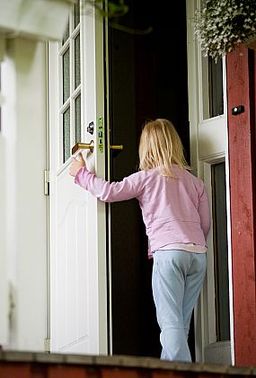今天是儿童节,我们继续关注跟儿童有关的词语表达。很多现在已经不是儿童的人们大概都曾经属于这样一个群体,脖子上挂串钥匙,放学回家自己开门,自己一个人在家待着写作业或看电视,饿了也只能忍着,等爸妈回来才能吃上饭。这就是我们今天要说的“挂钥匙儿童”。

Latchkey kid or latchkey child refers to a child who returns from school to an empty home because his or her parent or parents are away at work, or a child who is often left at home with little or no parental supervision.
“挂钥匙儿童”指因为父母出去工作,所以放学后独自在家、无人照看的孩子。
The term refers to the latchkey of a door to a house. The key is often strung around the child's neck or left hidden under a mat (or some other object) at the rear door to the property. The term is claimed to have originated from an NBC documentary in 1944, due to the phenomenon of children being left home alone becoming common during and after World War II, when one parent would be enlisted into the armed forces, so the other would get a job.
这里的“钥匙”指的就是房门的钥匙。这些孩子一般都把钥匙挂在脖子上或者藏在房子后门的门垫(或其它物件)底下。据说,“挂钥匙儿童”这个说法来自于NBC(美国全国广播公司)1944年的一部纪录片。这部纪录片讲的是二战以后,夫妻中的一方必须参军,而另一方就得出去工作养家,因此,把孩子独自留在家里的情况越来越普遍。
The effects of being a latchkey child differ with age. Loneliness, boredom and fear are most common for those younger than 10 years of age. In the early teens, there is a greater susceptibility to peer pressure, potentially resulting in alcohol abuse and smoking.
“挂钥匙儿童”的身份对孩子的影响因年龄而不同。十岁以下的孩子最容易感到孤独、无聊和恐惧。10-15岁之间的孩子们则会面临更多来自同伴的压力,可能导致的结果就是酗酒或者抽烟。
相关阅读
(中国日报网英语点津 Helen 编辑)